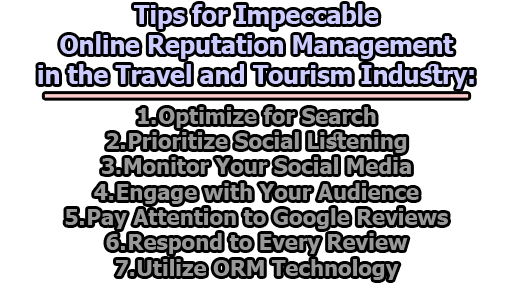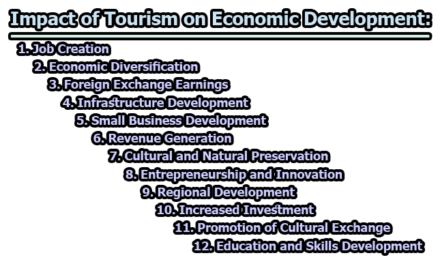Tips for Impeccable Online Reputation Management in the Travel and Tourism Industry:
Online reputation management (ORM) is crucial for businesses in every industry, and travel and tourism are no exception. A good reputation can help your business stand out from the competition, attract new customers, and build trust with your existing customers. However, a negative online reputation can hurt your business in many ways, including lost revenue, decreased visibility, and a damaged brand image. In this article, we’ll discuss some tips for impeccable online reputation management in the travel and tourism industry.
- Optimize for Search: Optimizing your website for search engines is an essential step in managing your online reputation. When potential customers are searching for travel-related information, you want to make sure that your website appears at the top of their search results. Here are some tips for optimizing your website:
- Use relevant keywords: Identify the keywords that your potential customers are likely to search for, and incorporate them into your website’s content, page titles, and Meta descriptions. However, be careful not to overuse keywords, as this can hurt your search engine rankings.
- Make your website mobile-friendly: More and more people are using their smartphones to search for travel information, so it’s crucial to ensure that your website is optimized for mobile devices. This means that your website should be easy to navigate on a small screen and load quickly on mobile devices.
- Use high-quality images and videos: Visual content can help you showcase your services and attract potential customers. Make sure to use high-quality images and videos that highlight the best aspects of your business.
- Include customer reviews and testimonials: Customer reviews and testimonials can help build trust with your audience and show that your business is reliable and trustworthy. Make sure to include reviews and testimonials on your website, and encourage your customers to leave feedback on third-party review sites.
- Prioritize Social Listening: Social listening involves monitoring social media channels for mentions of your business, products, or services. By doing so, you can quickly respond to negative feedback and address customer complaints before they escalate. Here are some tips for effective social listening:
- Set up alerts: Use social media listening tools like Hootsuite or Sprout Social to set up alerts for your business name, industry keywords, and competitors on social media channels. This will help you stay informed about what people are saying about your business on social media.
- Monitor social media channels regularly: It’s important to monitor social media channels regularly, including Facebook, Twitter, Instagram, and LinkedIn. By doing so, you can respond promptly to customer inquiries and address any negative comments.
- Analyze social media sentiment: Use social media analytics tools to analyze social media sentiment around your brand. This will help you understand how people perceive your business online and identify areas for improvement.
- Monitor Your Social Media: In addition to social listening, it’s essential to monitor your social media channels regularly. This means checking your social media accounts for new messages, comments, and mentions. Here are some tips for effective social media monitoring:
- Respond promptly to customer inquiries: When customers reach out to you on social media, it’s essential to respond promptly. This will help you build trust with your audience and show that you value their feedback.
- Share high-quality content: Use social media to share high-quality content that showcases your services and engages your audience. This can include blog posts, videos, and images.
- Use social media analytics: Use social media analytics to track your performance and adjust your social media strategy accordingly. This will help you understand what’s working and what’s not, and identify areas for improvement.
- Engage with Your Audience: Engaging with your audience on social media is essential for building trust and strengthening your online reputation. Here are some tips for effective audience engagement:
- Use social media to answer customer questions: Use social media to answer customer questions, provide helpful information, and address complaints. This will help you build trust with your audience and show that you’re responsive to their needs.
- Share user-generated content (UGC): UGC is content that your customers create, such as photos, videos, and reviews. Sharing UGC on your social media channels can help build trust with your audience and showcase your services.
- Host social media contests: Social media contests are a great way to engage your audience and generate excitement around your brand. Consider hosting contests that encourage your followers to share their travel experiences or showcase their creativity.
- Personalize your interactions: Use social media to personalize your interactions with your audience. Address your customers by name and respond to their comments and questions in a friendly and professional manner.
- Pay Attention to Google Reviews: Google reviews are an essential component of online reputation management. Positive reviews can help you attract new customers, while negative reviews can hurt your business. Here are some tips for managing your Google reviews:
- Claim your Google My Business listing: Claiming your Google My Business listing is essential for managing your online reputation on Google. This will allow you to control the information that appears in Google search results and respond to customer reviews.
- Respond to every review: Responding to every review, whether positive or negative, shows that you value your customers’ feedback and are committed to providing excellent service. Make sure to respond promptly and professionally to every review.
- Encourage customers to leave reviews: Encourage your customers to leave reviews on Google by providing them with excellent service and asking them to leave a review after their experience. You can also include a call-to-action on your website and social media channels.
- Respond to Every Review: Responding to every review, whether positive or negative, is critical for managing your online reputation. Here are some tips for responding to reviews:
- Thank customers for positive reviews: When a customer leaves a positive review, take the time to thank them for their feedback and express your appreciation for their business.
- Address negative reviews professionally: When a customer leaves a negative review, it’s essential to address their concerns professionally and offer a solution to their problem. Make sure to apologize for any inconvenience they may have experienced and provide them with a way to contact you directly to resolve the issue.
- Be respectful and professional: When responding to reviews, it’s important to remain respectful and professional, even if the review is negative. Remember that your response is visible to everyone and can impact your business’s reputation.
- Utilize ORM Technology: Finally, utilizing ORM technology can help you streamline your online reputation management efforts and ensure that you’re aware of any negative feedback as soon as it happens. Here are some ORM tools that can help:
- Brandwatch: Brandwatch is a social listening and analytics tool that can help you monitor your brand’s reputation online and identify potential issues before they escalate.
- com: Reputation.com offers a range of tools to help businesses manage their online reputation, including monitoring, suppression, and removal of negative content.
- ReviewTrackers: ReviewTrackers is a reputation management software that helps businesses monitor customer feedback and online reviews, analyze customer sentiment, and respond to reviews across multiple channels.
- Hootsuite Insights: Hootsuite Insights is a social listening tool that allows businesses to monitor their brand’s mentions across social media channels, track sentiment, and respond to customer feedback.
Using ORM technology can help you streamline your online reputation management efforts and ensure that you’re aware of any negative feedback as soon as it happens.
In conclusion, managing your online reputation in the travel and tourism industry is crucial for building trust with your audience and attracting new customers. By optimizing your website for search, prioritizing social listening, monitoring your social media channels, engaging with your audience, paying attention to Google reviews, responding to every review, and utilizing ORM technology, you can ensure that your business has an impeccable online reputation. Remember, managing your online reputation is an ongoing process, and it requires consistent effort and attention. But with the right strategy and tools, you can build a strong online reputation that will help your business succeed in the long run.
References:
- Buhalis, D., & Law, R. (2008). Progress in information technology and tourism management: 20 years on and 10 years after the Internet—The state of eTourism research. Tourism Management, 29(4), 609-623.
- Dimitrovski, D., Dejanova, B., & Koteski, C. (2019). Reputation management in the hospitality industry: A literature review. UTMS Journal of Economics, 10(2), 205-216.
- Evans, N., Stonehouse, G., & Campbell, D. (2012). Strategic management for travel and tourism. Routledge.
- Gretzel, U. (2011). Intelligent tourism promotion: A framework for tourism destination management. Journal of Travel Research, 50(1), 5-14.
- Kaplan, A. M., & Haenlein, M. (2010). Users of the world, unite! The challenges and opportunities of social media. Business Horizons, 53(1), 59-68.
- Leung, X. Y., & Bai, B. (2019). An analysis of online reputation management strategies in the hospitality industry: Evidence from TripAdvisor. Journal of Hospitality and Tourism Management, 41, 100-109.
- Xiang, Z., Du, Q., Ma, Y., & Fan, W. (2017). A comparative analysis of major online review platforms: Implications for social media analytics in hospitality and tourism. Tourism Management, 58, 51-65.

Library Lecturer at Nurul Amin Degree College










